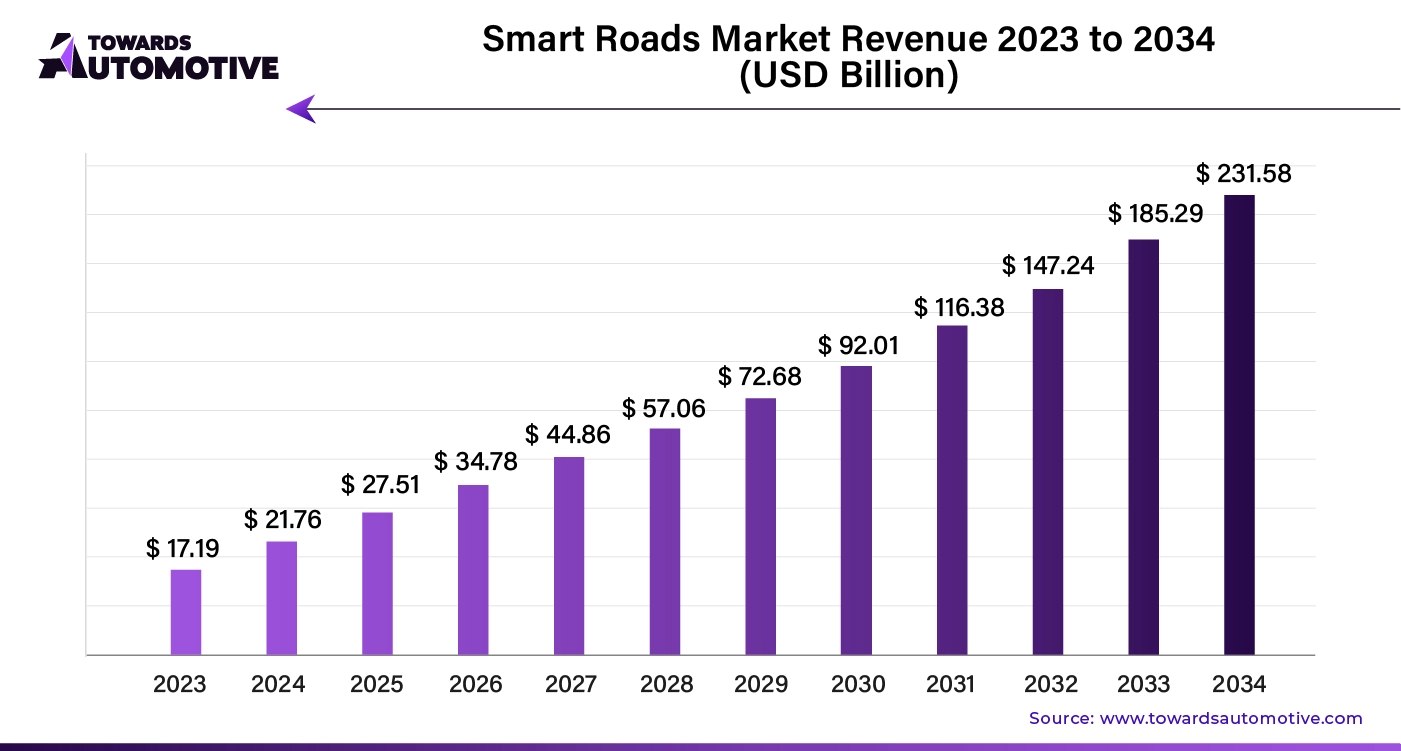Artificial intelligence (AI) is at the forefront of transforming the smart roads market, enabling intelligent decision-making, predictive analytics, and automation. These advancements are enhancing road safety, improving traffic efficiency, and promoting sustainability. By integrating AI with sensors, cameras, and IoT devices, smart roads are capable of collecting and analyzing vast amounts of data on traffic patterns, road conditions, and vehicle behavior. This data-driven approach is revolutionizing transportation networks, making them more responsive, efficient, and safer for all users.
The global smart roads market is experiencing exponential growth, reflecting the increasing adoption of AI and IoT technologies in transportation infrastructure. In 2024, the market size is estimated at USD 21.76 billion, and it is projected to expand at a remarkable compound annual growth rate (CAGR) of 26.65% over the next decade, reaching a staggering USD 231.58 billion by 2034. This growth underscores the transformative potential of AI in reshaping the future of transportation.

Get All the Details in Our Solution – Download Brochure @ https://www.towardsautomotive.com/download-brochure/1463
AI’s Role in Optimizing Traffic Flow
One of the most significant contributions of AI in smart roads is its ability to optimize traffic flow. AI-driven traffic management systems leverage real-time data to predict congestion, dynamically adjust traffic signals, and reroute vehicles to less congested paths. This not only reduces delays for commuters but also improves fuel efficiency, contributing to lower emissions and a greener environment. By analyzing historical and real-time data, AI can identify traffic bottlenecks and implement proactive measures to mitigate them, ensuring smoother and more efficient transportation networks.
Enhancing Road Safety with AI
AI plays a critical role in enhancing road safety by detecting and responding to hazardous conditions in real time. For instance, AI-powered systems can identify icy roads, accidents, or obstacles and immediately communicate alerts to nearby vehicles, helping to prevent collisions. Additionally, AI-enabled cameras and sensors can monitor driver behavior, such as speeding or distracted driving, and issue warnings or notifications to improve compliance with traffic rules. These capabilities are instrumental in reducing accidents and saving lives on the road.
Supporting Autonomous Vehicles (AVs)
The integration of AI in smart roads is also paving the way for the widespread adoption of autonomous vehicles (AVs). Through vehicle-to-infrastructure (V2I) communication, smart roads can interact with AVs, providing real-time guidance on navigation, traffic conditions, and potential hazards. This seamless interaction ensures safer and more efficient driving for autonomous vehicles, which rely heavily on accurate and up-to-date data to operate effectively. As AVs become more prevalent, AI-enabled smart roads will play a crucial role in supporting their integration into existing transportation systems.
Predictive Maintenance for Sustainable Infrastructure
AI-driven predictive maintenance systems are another key component of smart roads. By continuously analyzing road conditions, these systems can identify wear and tear or potential issues before they become major problems. This allows for timely repairs, reducing long-term infrastructure costs and minimizing disruptions to traffic. Predictive maintenance not only extends the lifespan of road infrastructure but also ensures that roads remain safe and functional for all users.
Case Study: i-RASTE in Telangana, India
A prime example of AI’s transformative impact on smart roads is the i-RASTE project launched by the government of Telangana, India, in July 2022. i-RASTE is an AI-enabled smart road initiative aimed at enhancing road safety through advanced data analytics and real-time monitoring. By leveraging AI, the project seeks to identify high-risk areas, predict potential accidents, and implement preventive measures to reduce road fatalities. This innovative approach demonstrates how AI can be harnessed to create safer and more efficient transportation networks, particularly in regions with high traffic density and challenging road conditions.
The Future of Smart Roads
As AI technology continues to evolve, its applications in smart roads will become even more sophisticated. From optimizing traffic flow and enhancing safety to supporting autonomous vehicles and enabling predictive maintenance, AI is driving the evolution of transportation networks. The result is a more intelligent, responsive, and sustainable infrastructure that benefits both individuals and communities.
The rapid growth of the smart roads market, projected to reach USD 231.58 billion by 2034, highlights the increasing demand for AI-driven solutions in transportation. Governments and private sectors worldwide are investing heavily in smart road technologies to address urbanization challenges, reduce traffic congestion, and improve road safety. This growth trajectory underscores the pivotal role of AI in shaping the future of transportation.
Invest in Our Premium Strategic Solution @ https://www.towardsautomotive.com/price/1463
You can place an order or ask any questions, please feel free to contact us at sales@towardsautomotive.com
Explore the comprehensive statistics and insights on automotive industry data and its associated segmentation: Get a Subscription
For Latest Update Follow Us: https://www.linkedin.com/company/towards-automotive
